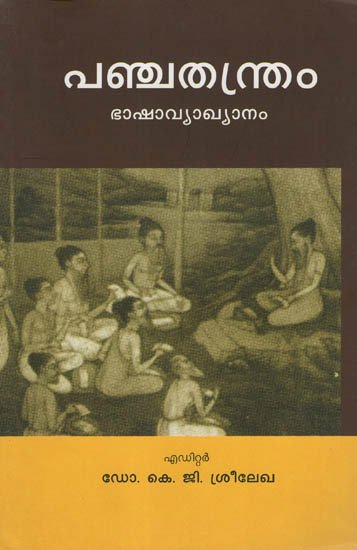Panchatantra [sanskrit]
by Dr. Naveen Kumar Jha | 2016 | 13,828 words | ISBN-13: 9788193077962
The Sanskrit edition of the Panchatantra referencing the English translation and grammatical analysis. Written by Vishnu Sharma and possibly dating as early as 1200 BCE, the Panchatantra (or Pancatantra) represents a collection of short stories teaching basic ethical values and moral conduct that was commonly practiced in ancient Indian. Alternative titles: Śrīviṣṇuśarman Pañcatantra (श्रीविष्णुशर्मन् पञ्चतन्त्र, Śrī-viṣṇuśarman pancatantra, श्री-विष्णुशर्मन्, Sri-visnusarman)
Verse 0.6
अनन्तपारं किल शब्द-शास्त्रं स्वल्पं तथायुर् बहवश् च विघ्नाः ।
सारं ततो ग्राह्यम् अपास्य फल्गु हंसैर् यथा क्षीरम् इवाम्बुध्यात् ॥ ६ ॥
anantapāraṃ kila śabda-śāstraṃ svalpaṃ tathāyur bahavaś ca vighnāḥ |
sāraṃ tato grāhyam apāsya phalgu haṃsair yathā kṣīram ivāmbudhyāt || 6 ||
The English translation of Panchatantra Verse 0.6 is contained in the book The Complete Pancatantra: Sanskrit Text with English Translation by Dr. Naveen Kumar Jha. This book is not available online so in order to read the full text and translation you should buy the book:
Buy now! English translation by Dr. Naveen Kumar Jha (2016)
Glossary of Sanskrit terms
Note: This extracts Sanskrit terms and links to English definitions from the glossary, based on an experimental segmentation of verse (0.6). Some terms could be superfluous while some might not be mentioned. Click on the word to show English definitions.
Anantapara, Kila, Shabda, Shastra, Svalpa, Tatha, Bahu, Bahava, Vighna, Sara, Tatah, Tad, Tata, Grahya, Apasya, Phalgu, Hamsa, Yatha, Kshira, Iva, Ambudhi,
Analysis of Sanskrit grammar
Note: this is an experimental feature and only shows the first possible analysis of the Sanskrit text (Panchatantra Verse 0.6). If the system was successful in segmenting the sentence, you will see of which words it is made up of, generally consisting of Nouns, Pronouns, Verbs, Participles and Indeclinables. Click on the link to show all possible derivations of the word.
- Line 1: “anantapāraṃ kila śabda-śāstraṃ svalpaṃ tathāyur bahavaś ca vighnāḥ ”
- anantapāram -
-
anantapāra (noun, masculine)[adverb], [accusative single]anantapāra (noun, neuter)[adverb], [nominative single], [accusative single]anantapārā (noun, feminine)[adverb]
- kila -
-
kila (indeclinable particle)[indeclinable particle]kila (noun, masculine)[compound], [vocative single]√kil (verb class 6)[imperative active second single]
- śabda -
-
śabda (noun, masculine)[compound], [vocative single]
- śāstram -
-
śāstra (noun, neuter)[adverb], [nominative single], [accusative single]
- svalpam -
-
svalpa (noun, masculine)[adverb], [accusative single]svalpa (noun, neuter)[adverb], [nominative single], [accusative single]svalpā (noun, feminine)[adverb]
- tathā -
-
tathā (indeclinable correlative)[indeclinable correlative]tathā (indeclinable)[indeclinable]tatha (noun, masculine)[compound], [vocative single]tatha (noun, neuter)[compound], [vocative single]tathā (noun, feminine)[nominative single]
- ayur -
-
√yā (verb class 2)[imperfect active third plural]
- bahavaś -
-
bahu (noun, masculine)[nominative plural], [vocative plural]bahava (noun, masculine)[nominative single]
- ca -
-
ca (indeclinable conjunction)[indeclinable conjunction]ca (noun, masculine)[compound], [vocative single]ca (noun, neuter)[compound], [vocative single]
- vighnāḥ -
-
vighna (noun, masculine)[nominative plural], [vocative plural]
- Line 2: “sāraṃ tato grāhyam apāsya phalgu haṃsair yathā kṣīram ivāmbudhyāt ”
- sāram -
-
sāra (noun, masculine)[adverb], [accusative single]sāra (noun, neuter)[adverb], [nominative single], [accusative single]sārā (noun, feminine)[adverb]√sṛ -> sāram (absolutive)[absolutive from √sṛ]√sṛ -> sāram (absolutive)[absolutive from √sṛ]
- tato* -
-
tataḥ (indeclinable adverb)[indeclinable adverb]tataḥ (indeclinable correlative)[indeclinable correlative]tataḥ (indeclinable)[indeclinable]tad (noun, neuter)[ablative single], [ablative dual], [ablative plural]tata (noun, masculine)[nominative single]√tan -> tata (participle, masculine)[nominative single from √tan class 8 verb]sa (noun, masculine)[ablative single], [ablative dual], [ablative plural]sā (noun, feminine)[ablative single], [ablative dual], [ablative plural]
- grāhyam -
-
grāhya (noun, masculine)[adverb], [accusative single]grāhya (noun, neuter)[adverb], [nominative single], [accusative single]grāhyā (noun, feminine)[adverb]√grah -> grāhya (participle, masculine)[adverb from √grah]√grah -> grāhya (participle, neuter)[adverb from √grah]√grah -> grāhyā (participle, feminine)[adverb from √grah]√grah -> grāhya (participle, masculine)[accusative single from √grah class 9 verb], [accusative single from √grah]√grah -> grāhya (participle, neuter)[nominative single from √grah class 9 verb], [accusative single from √grah class 9 verb], [nominative single from √grah], [accusative single from √grah]
- apāsya -
-
apāsya (indeclinable)[indeclinable]apāsya (noun, masculine)[compound], [vocative single]apāsya (noun, neuter)[compound], [vocative single]
- phalgu -
-
phalgu (noun, feminine)[compound], [adverb]phalgu (noun, masculine)[compound], [adverb]phalgu (noun, neuter)[compound], [adverb], [nominative single], [vocative single], [accusative single]phalgū (noun, masculine)[adverb], [vocative single]phalgū (noun, feminine)[compound], [adverb], [vocative single]phalgū (noun, neuter)[compound], [adverb], [nominative single], [vocative single], [accusative single]
- haṃsair -
-
haṃsa (noun, masculine)[instrumental plural]
- yathā -
-
yathā (indeclinable adverb)[indeclinable adverb]yathā (indeclinable relative)[indeclinable relative]yathā (indeclinable)[indeclinable]
- kṣīram -
-
kṣīra (noun, masculine)[adverb], [accusative single]kṣīra (noun, neuter)[adverb], [nominative single], [accusative single]kṣīrā (noun, feminine)[adverb]
- ivā -
-
iva (indeclinable adverb)[indeclinable adverb]iva (indeclinable)[indeclinable]
- ambudhyā -
-
ambudhi (noun, masculine)[compound], [adverb], [nominative dual], [vocative dual], [accusative dual]
- āt -
-
āt (indeclinable particle)[indeclinable particle]a (noun, masculine)[adverb], [ablative single]
Other editions:
Also see the following editions of the Sanskrit text or (alternative) English translations of the Panchatantra Verse 0.6
Pancatantra of Visnusarman
by M. R. Kale (2015)
Panchatantra in Simple Sanskrit
by Dr. Vishwas (2016)
Panchatantram (Telugu)
by Tadanki Venkata Lakshmi Narasimha Rao (2020)
Published by J. P. Publications, Vijayawada; Throughout black & white Illustrations; 9788192053851.
Buy now!Preview of verse 0.6 in Telugu sript:
అనన్తపారం కిల శబ్ద-శాస్త్రం స్వల్పం తథాయుర్ బహవశ్ చ విఘ్నాః ।
సారం తతో గ్రాహ్యమ్ అపాస్య ఫల్గు హంసైర్ యథా క్షీరమ్ ఇవామ్బుధ్యాత్ ॥ ౬ ॥
Panchatantram Bhashavyakhyanam (Malayalam)
by Dr. K.G. Sreelekha (2010)
Published by the University of Kerala.
Buy now!Preview of verse 0.6 in Malayalam sript:
അനന്തപാരം കില ശബ്ദ-ശാസ്ത്രം സ്വല്പം തഥായുര് ബഹവശ് ച വിഘ്നാഃ ।
സാരം തതോ ഗ്രാഹ്യമ് അപാസ്യ ഫല്ഗു ഹംസൈര് യഥാ ക്ഷീരമ് ഇവാമ്ബുധ്യാത് ॥ ൬ ॥
The Panchatantra Stories (Tamil)
by P. S. Aacharya (2017)
Published by Narmadha Pathippagam, Chennai.
Buy now!
Panchatantrer Galpa (Bengali)
by Children's Book Trust (2014)
Throughout color Illustration; 9788170112730
Buy now!Preview of verse 0.6 in Bengali sript:
অনন্তপারং কিল শব্দ-শাস্ত্রং স্বল্পং তথাযুর্ বহবশ্ চ বিঘ্নাঃ ।
সারং ততো গ্রাহ্যম্ অপাস্য ফল্গু হংসৈর্ যথা ক্ষীরম্ ইবাম্বুধ্যাত্ ॥ ৬ ॥
Panchatantra in Gujarati (Comic)
by Anant Pai (2013)
[શિયાળા અને રણશિંગ પંચતંત્ર] Published by Amar Chitra Katha; Throughout Color Illustrations; 9789350853115
Buy now!Preview of verse 0.6 in Gujarati sript:
અનન્તપારં કિલ શબ્દ-શાસ્ત્રં સ્વલ્પં તથાયુર્ બહવશ્ ચ વિઘ્નાઃ ।
સારં તતો ગ્રાહ્યમ્ અપાસ્ય ફલ્ગુ હંસૈર્ યથા ક્ષીરમ્ ઇવામ્બુધ્યાત્ ॥ ૬ ॥
![Panchatantra [sanskrit] - book cover](/uploads/a/Pancatantra.jpg)






